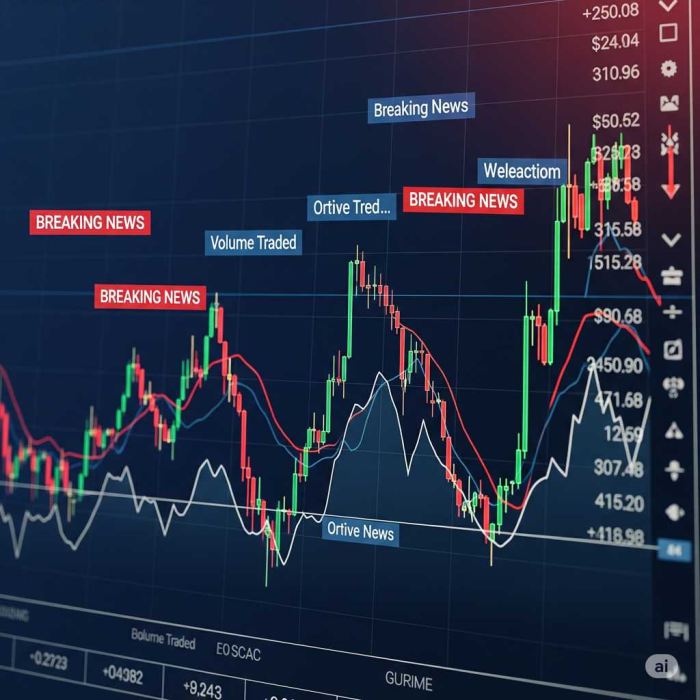Anticipating the Ripple | Navigating Market Reactions to News
In the fast-paced world of finance, where fortunes can be made or lost in milliseconds, understanding how markets react to news is akin to possessing a crystal ball. From a surprise earnings report to a geopolitical seismic shift, every piece of information sends ripples through the financial landscape. But it's not just about what the news is, it's about how the market interprets and anticipates it.
As of today, June 12, 2025, we're seeing this play out in real-time. Global shares are mixed, with some markets shrugging off the latest China-U.S. trade talks, while others react to inflation reports or company-specific updates. This constant flux underscores the importance of a nuanced approach to news.

So, how can investors and traders better anticipate these market reactions and gain an edge?
Beyond the Headline: Understanding Market Sentiment
The immediate impact of news often comes down to market sentiment – the collective mood and attitude of investors. Positive news typically fuels optimism, leading to buying pressure and rising prices. Conversely, negative news can trigger fear, prompting selling and price declines.
However, it's rarely that simple. Here's what to consider:
- The Element of Surprise: Expected news tends to have a more muted reaction, as it's often already "priced in" by the market. It's the unexpected announcements or deviations from forecasts that create the most significant volatility. For example, a company meeting analyst expectations might see a neutral reaction, while exceeding them can cause a surge, and missing them a sharp drop.
- The Severity and Scope: A minor regulatory change for a niche industry will have a far different impact than a major shift in global trade policy or a natural disaster affecting a vast region. The scale and potential ramifications of the news are crucial.
- Context is King: The same piece of news can have different implications depending on the prevailing market conditions. Bad news during a bear market might lead to a more severe negative reaction than the same news during a bull market.
- Source Credibility and Dissemination: Where the news originates and how widely and quickly it spreads also plays a role. Official government reports, central bank announcements, and reputable financial news outlets tend to carry more weight than unverified social media chatter, though the latter can still create irrational, short-term movements.
Tools and Strategies for Anticipation
Professional traders don't just react to the news; they strive to anticipate it. This involves a combination of fundamental analysis, technical indicators, and a deep understanding of market psychology:
- Economic Calendars: Stay informed about upcoming economic data releases (inflation reports, employment figures, GDP growth, interest rate decisions) and corporate earnings announcements. These are pre-scheduled events with high potential to move markets.
- Sentiment Analysis Tools: Increasingly, AI and natural language processing are being used to analyze the tone and emotion of news articles, social media posts, and financial reports. These tools can help gauge the overall bullish or bearish sentiment surrounding a particular asset or sector.
- Technical Analysis: While news is fundamental, technical analysis can reveal how the market is reacting to the news. Looking at price charts, volume, and various indicators can help identify trends, support and resistance levels, and potential breakout or breakdown points.
- Monitoring Key Market Drivers: Identify the specific factors that influence the assets you trade. For currencies, it's economic indicators and monetary policies. For stocks, it's company-specific news, industry trends, and leadership changes.
- Understanding "Whisper Numbers": Before official releases, unofficial estimates or "whisper numbers" circulate among traders. While not always accurate, they can influence initial market reactions.
- Scenario Planning: Consider different potential outcomes of upcoming news events and how you would adjust your strategy for each. This proactive approach helps avoid emotional, impulsive decisions.
- Risk Management: Even with the best anticipation, markets are inherently unpredictable. Always employ sound risk management techniques, such as setting stop-loss orders, to protect your capital from unexpected market swings.
The Bottom Line
In the dynamic world of financial markets, news is a constant and powerful force. While predicting its exact impact is impossible, a disciplined approach that combines fundamental understanding, sentiment analysis, and proactive planning can significantly improve an investor's ability to anticipate and navigate market reactions. Remember, the goal isn't to chase headlines, but to understand the underlying currents they create.
Popular Tags